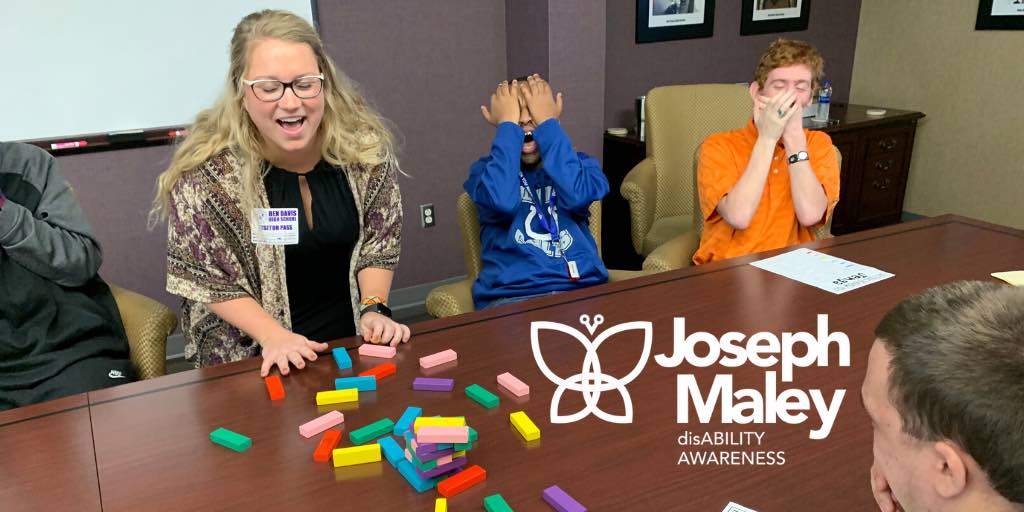To celebrate Disability Awareness Month, JMF will be releasing new blogs each week that focus on the impact of our disABILITY Awareness program. This week, we interviewed disABILITY Awareness Manager, Chelsea McCloskey, and asked her to share her experience with this program, and why she is so passionate about disability awareness education for all.

You’ve been the disABILITY Awareness Manager for nearly two years now. What made you take on this position, and how has the experience been so far?
Two years ago, I was a special education teacher, looking for a position that allowed me the flexibility to complete graduate school in Marriage and Family Therapy. Leaving the teaching profession was incredibly difficult for me because I am so passionate about teaching individuals who have disabilities. It was my professor who recommended looking into the Joseph Maley Foundation. JMF allows me the flexibility to complete graduate school, while also remaining in the field I am so passionate about – inclusion for all. To be honest, transitioning from being hands-on with students daily, to not as much direct time with students was an adjustment for me, but I realized that I AM still advocating for students who have disabilities, just in a different way. I have loved getting to see and be a part of the growth in our disABILITY Awareness program, and I cannot wait to see where the growth continues.
As the disABILITY Awareness Manager, you’ve spent a considerable amount of time working directly with the schools and organizations that utilize this program. What has it been like to work with over 40 program partners, and how does disABILITY Awareness meet each school’s specific needs?
Prior to starting at the Joseph Maley Foundation, my knowledge and experience was solely in public education. At JMF we serve all types of schools and organizations, and it has been such a great learning experience for me. While each of our program partner’s needs are different, the one thing they all have in common is that they teach little humans, who all come from different backgrounds and are trying the best they can. We look at the needs of all of our program partners and are continuously tweaking our program to stay up to date and relevant to what is happening in the schools.
What is your favorite piece of the disABILITY Awareness program?
One of my favorite pieces of disABILITY Awareness is getting to know our speakers and hear them talk to classes. I love seeing our speakers advocating for themselves and sharing their stories with students. They are open to questions from the students and answer them honestly. Our speakers share their knowledge about their disability and also share their abilities with the students. Many students will say things like, “me too!” during their presentations and I find that very powerful for everyone involved, even if it is about their favorite color being blue! Around JMF, we love to “share our similarities and celebrate our differences” and I think our speakers do a masterful job of showing that in their presentations.
Personally, why do you feel that disability awareness education as a whole is important for our community?
I have two phrases I often like to use: “you don’t know, what you don’t know” and “your experience is your experience.” For disABILITY Awareness, part of our program is raising awareness alongside teaching empathy (not sympathy), and inclusion for all. I like to use those phrases to help understand the various schools we serve and their students. Students come from all different backgrounds and we do not know what they know or what their experience has been in life so far. This goes for school staff and other adults as well. disABILITY Awareness helps to raise awareness for those individuals who have not heard of the things we teach about before. Those students can take what they learn from this program, and share that knowledge with their friends and families, creating a cycle of awareness that promotes empathy and inclusion for all.
Finally, how have YOU seen the impact of this program?
One way in which I have seen the impact of our disABILITY Awareness program is when we get new inquiries from schools. When I follow up with these schools, I usually find out that someone from the inquiring school saw our program in their own child’s school and would love to bring it to the school where they work. The program continues to grow itself by word of mouth, which I believe speaks to the remarkable impact of disABILITY Awareness.



If you would like to bring disABILITY Awareness programming to a school you know, please contact Chelsea McCloskey at cmccloskey@josephmaley.org
